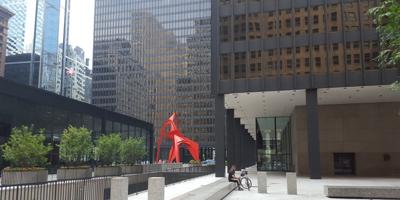
Dirksen Federal Courthouse, Chicago
A federal appeals court has turned aside objections by the owners of Boston Market and other restaurants to a $75 million settlement over the price of chicken, which the restaurants said was too low because it provided no money for alleged bid-rigging by chicken producers.
On Aug. 6, a three-judge panel of the U.S. Seventh Circuit Court of Appeals said the restaurants were bound by settlement and had not demonstrated the settlement was "unreasonably small."
The judges said their reasoning in this appeal was the same as in an earlier appeal by the same restaurant plaintiffs, as they sought to undo a settlement with a different group of chicken producers.
"Although Boston Market contended that the settlement did not reflect the value of a bid-rigging claim, which the class had agreed to forgo in exchange for faster resolution, Boston Market is bound by the class’s decision," the judges wrote.
"We added that the evidence did not show that the settlement produced unreasonably low value for the class, given the risks of complete defeat in the litigation."
The settlement being challenged in the most recent decision was reached in 2023 with chicken producers Koch Foods and House of Raeford Farms.
Koch Foods, which is headquartered in Chicago's suburbs, is owned by Chicago native billionaire Joseph Grendys.
Under those settlements, Koch would pay $47.5 million, while HRF would pay $27.5 million.
Attorneys for the plaintiffs were awarded one-third of the settlement as fees.
Overall, plaintiffs' lawyers were granted $37.3 million in fees for negotiating more than $115 million in settlements with Koch, HRF and five other chicken producers.
Plaintiffs have been represented by attorneys from the firms of Pearson Warshaw LLP, of Sherman Oaks and San Francisco, California; Lockridge Grindal Nauen PLLP, of Minneapolis; and Hart McLaughlin & Eldridge LLC, of Chicago.
Since 2016, chicken producers have defended against a wave of collective antitrust suits, all centered on accusations that the producers used internal data supplied from a publication called AgriStats to suppress the supply of chicken and artificially drive up prices.
The U.S. Department of Justice launched its own investigation into the matter, as well.
The proceedings were centralized in Chicago federal court before U.S. District Judge Thomas M. Durkin.
The proceedings were then divided into class actions on behalf of three groups: the so-called “direct purchasers,” like retail supermarkets; “indirect purchasers,” including restaurants; and “end users,” including consumers.
After a federal judge approved the settlements in question, the restaurants lodged objections, saying they believed the chicken producers got off too easy. They asserted the plaintiffs' counsel should have demanded and secured much more, particularly since the settlements allowed them to collect nothing for their claims the poultry producers had gotten off on "bid rigging" allegations included in the lawsuit.
Those claims were rejected by Judge Durkin, teeing up appeals.
The Seventh Circuit also rejected those claims on appeal, first in a contest of the settlement led by Simmons Foods and now, again in the objections challenging the settlement with Koch and HRF.
The latest ruling was delivered in an unsigned order issued by a panel including Seventh Circuit Judges Frank H. Easterbrook, David F. Hamilton and Nancy L. Maldonado.
In both instances, the Seventh Circuit judges said the restaurants failed to prove the settlements were too small, particularly in light of the chances that the plaintiffs could lose at trial and receive nothing.
Chicken producer Sanderson Farms, for instance, prevailed at trial in 2023, winning a victory they said demonstrated the antitrust claims couldn't hold up in court.






